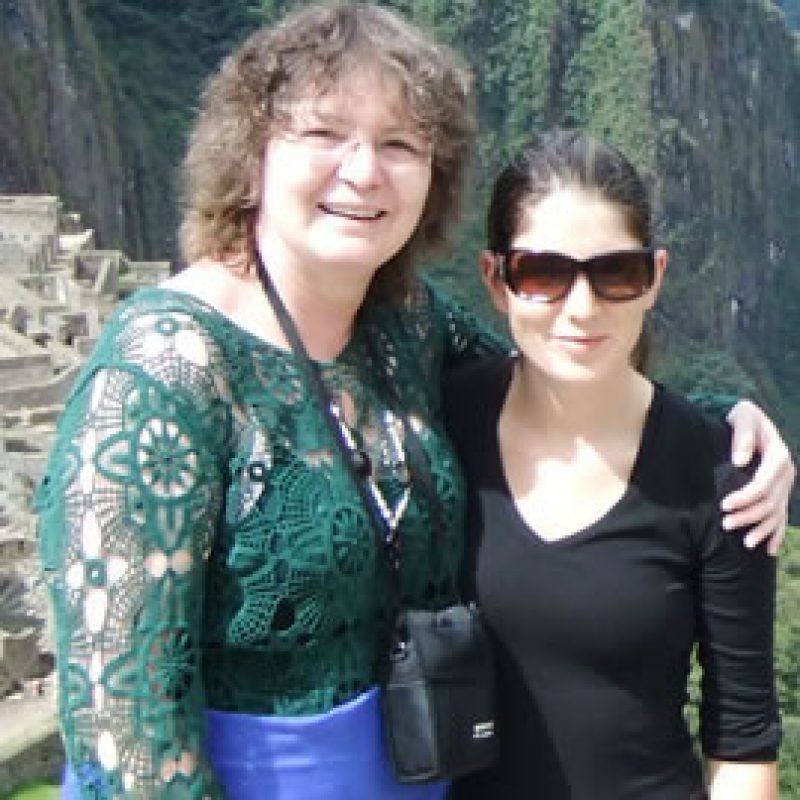
Interview with Dr Amanda Havard, consultant radiologist and director of breast screening at Milton Keynes Hospital. Amanda is also trust lead for central nervous system cancer.
Here she tells us about her passion for eco-tourism.
-
I’m a fifth generation doctor and when I was young my father swapped houses with other doctors around Europe. My family travelled every year and I was introduced to their passions from a very young age. My father wanted to be an archaeologist and my mother had a passion for the arts. I often travelled with my mother back then just as I travel with my daughter now.
I enjoy learning new things and finding out about the people who live in different countries and cultures. I’m simply no good on beach holidays – I just get too bored.
-
I have to admit that I learn enormous amounts from Lucy and we often learn new things when we’re travelling together.
Lucy is a conservation strategist and has been working with the Royal Botanic Gardens of Kew in the forests of Bolivia. She has been researching the unsustainable agricultural practices in the region and the impact it has on soil degradation. This results in a lack of fresh fruit and vegetables for the people living there. Kew’s Forest Futures project involved designing and trialling sustainable agriculture within the communities to improve nutrition and reduce the need for ‘slash and burn’ agriculture.
I can’t blame her for going to live in the rainforest – it’s partly my fault as I took her to exotic locations and she has been passionate about going to the Amazon since seeing a documentary on it when she was eight. The children travelled with me from a young age and have embraced my love of new cultures and communities. Now she challenges me – I don’t actually like the rainforest for example – it’s hot and sticky! But through her I can appreciate the incredible diversity of flora and fauna and how important it is for our planet on a much wider scale.
-
I met Lucy in Quito, Ecuador for a brilliant trip to the Andes and Galapagos Islands. We headed to a fabulous hacienda in the Andes owned by an ex-president’s family. It’s an eco-lodge called Hacienda Zuleta which helps the community by letting them farm cattle on the land. We even hand-milked some cows! The owners also operate a cheese factory employing local people and a condor rescue centre. We then stayed with a friend who has a flower farm and teaches local people to grow gypsophila.
We spent a further seven days on a fabulous boat sailing around the Galapagos with a crew of 17 for only 16 passengers learning about how people are working to conserve the islands, the risk-benefits of ecotourism and about the geology. One of the smaller islands we visited is only 32,000 years old!
One of my favourite trips was when I met Lucy in Buenos Aires, went on to Iguassu Falls, then Rio then Macchu Picchu and Cusco (we had both been there separately, me in the 80s) and then she took me to her home town of Puerto Maldonado, a frontier rainforest town. From there we went deep into the jungle, at least a day up river, to stay at her ecolodge and research station situated on an oxbow lake on the River Las Piedras, Madre de Dios. Every morning and evening a family of giant otters swam past my hut!
-
Tourism can really help – the money we bring in to an area can be crucial to developing sustainable incomes for local communities. We just have to be responsible about the way we go about it. Find out before you travel if your money is going to local communities through an independent travel company or if it is swallowed by a giant, faceless organisation.
Last year we had an amazing time in Cambodia and Laos. I always conduct a substantial amount of research before we go. For me, half the enjoyment of travel is researching what to do beforehand and I discovered a community project called ‘book boats’ which takes donated books to children in villages along the Mekong River. The boats reach more than 100 riverside villages who would otherwise never see books. For just $2 you can choose a book, put it in a book bag and they are taken on the boat. When the boats arrive in the village the children run to them with great excitement. Small things can really make a difference.
We also learned how a project to revive ancient arts and crafts in Siem Reap (Angkor Watt) is improving the lives of mine victims living in rural areas by teaching them traditional skills in silk-making, painting, stone and wood-carving. The skills they gain help them to provide for their families and the end result is very high-end products.
-
My work is busy but I take one major holiday a year which is normally with Lucy (and often expensive for that reason!) I have a smaller holiday with a good friend that is more of a bargain break.
When I retire I will have much more time for travelling and will enjoy researching the many places to visit. Lucy wants me to live in Peru with her to look after her future children. I’m not sure about that idea but I look forward to being able to help her with her ongoing work.
I do have a retirement project in mind – I want to write a children’s education book raising awareness about conservation issues with profits going to charities.